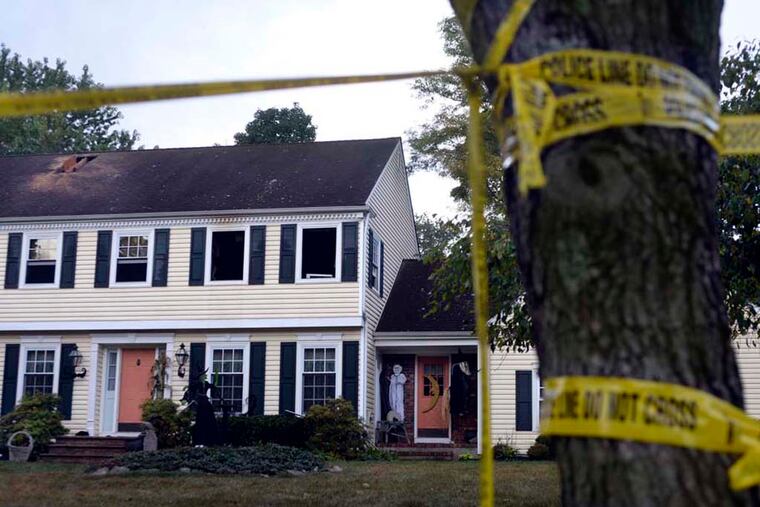Crimes were compounded by a cover-up
Early on the morning of Sept. 28, police and emergency workers responded to a fire at the central New Jersey home of John and Joyce Sheridan, where, we now know, they found the couple in their smoke-filled bedroom with fatal stab wounds. On searching the

Early on the morning of Sept. 28, police and emergency workers responded to a fire at the central New Jersey home of John and Joyce Sheridan, where, we now know, they found the couple in their smoke-filled bedroom with fatal stab wounds. On searching the scene, detectives found two large kitchen knives, a length of melted metal, a half-empty gas can, and a box of matches. They also allegedly found cocaine, baggies, and a scale in a car at the home, which led to the arrest of one of the Sheridans' sons that day.
Even if one of the dead were not a political figure as prominent as John Sheridan - who served four Republican governors before becoming the CEO of Cooper Health System, which is chaired by Democratic power broker George Norcross - New Jersey law dictates that most of the information above should have been released immediately. Crimes committed, weapons used, and arrests made must be "available to the public within 24 hours or as soon as practicable."
And yet on that Sunday six months ago, Somerset County Prosecutor Geoffrey Soriano's office described what authorities had encountered, vaguely and inaccurately, as a "fatal fire," noting only that detectives were "investigating the circumstances surrounding the deaths of Mr. and Mrs. Sheridan." The Prosecutor's Office went on to conceal what had actually happened for months, including:
Joyce Sheridan's murder, which was not disclosed for two months - and even then only by virtue of a county surrogate's record obtained by The Inquirer. Indeed, it was not until five months after the retired schoolteacher was killed that a spokesman for the state Attorney General's Office, which assisted in the investigation and is ultimately responsible for county prosecutors, became the first official to publicly acknowledge that she had been stabbed to death. The Prosecutors Office, meanwhile, did not announce that a homicide had been committed for another month, or almost six months after the fact.
John Sheridan's injuries from a possibly fatal stabbing - which the Prosecutor's Office declared self-inflicted just over a week ago - as well as a toppled armoire that broke five of his ribs. Even as investigators considered whether his death was also a homicide, those facts were concealed for nearly six months.
The weapons used in the crime, at least one of which was recovered that day - and, moreover, the fact that the crime involved a weapon or violence of any kind - remained undisclosed for six months.
The drug arrest, which was covered up for 45 days, and even then was revealed only by a police record obtained by The Inquirer. Furthermore, once it became public, the Prosecutor's Office itself declared the arrest irrelevant to the Sheridans' deaths - proving that its concealment, contrary to official claims, served no investigative purpose and therefore was in violation of state law.
The willful obfuscation of such rudimentary information about crimes and arrests undermines basic principles of open, democratic government. In fact, New Jersey's legal requirements in this area are seldom raised because most law enforcement agencies understand and abide by their obligation to disclose such information as a matter of course. The Somerset County Prosecutor's Office, however, has threatened to establish a new and dangerous precedent of covered-up crimes, secret arrests, and official unaccountability.
Soriano's handling of the case - which has so far been implicitly condoned by state officials - violated the spirit as well as the letter of open-government precepts. The prosecutor has not publicly answered a single question or consented to an interview about the Sheridans' deaths since he assumed responsibility for investigating them six months ago. Even his spokesman has communicated almost exclusively by tersely worded, nonresponsive e-mails, while referring to pending laboratory analyses and autopsy reports that were not mentioned again for months.
Beyond showing disdain for his obligations to the public, the prosecutor's compulsive secrecy did nothing to engender faith in his disputed conclusion that John Sheridan killed his wife and then himself. Facing such a high-profile investigation, Soriano should have been that much more eager to promote public confidence in the investigation. In the event, the Sheridan family has challenged the office's conclusions, promised a lawsuit, and, on Friday, denounced the investigation on national television
Beyond any civil case, the prosecutor's handling of the investigation, and particularly his rank disregard for the Open Public Records Act, warrant further review by the state comptroller and the Attorney General's Office, which should treat it as an affront to responsible law enforcement.